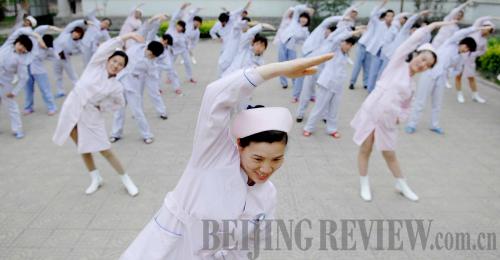 |
|
STAY FIT: Teenage patients in a psychiatric hopsital in Henan Province exercise under the lead of nurses (CFP) |
"Many parents care too much about their children's grades and do not communicate with their children, neglecting their psychological needs," Sun said.
Li Yan's mother did not go to university, but she was bent on sending her daughter to one, a good one. But Li did not score enough on her high-school entrance exam. Though her mother did not make much money, she borrowed and paid the school 10,000 yuan ($1,565) extra to take Li in a good high school.
Li cherished the opportunity "bought" by her mother, and studied hard. In the first year, she did well. But in the second year, her ranking in class slid several places. Her parents got nervous. "If you do not study hard and get a good enough score to go to a good university, you will waste the money I paid," the mother repeatedly said to Li.
Her mother began to monitor Li more frequently. Except for sleeping at night and having meals, the only thing Li was allowed to do was to study. Her mother seldom talked to Li for fear of disturbing her.
As the pressure on her mounted, Li began to suffer insomnia and was unable to focus. She was eventually sent to a mental health institution. Her mother then regretted her actions, "I should not have put so much pressure on her."
Sun and Ruan found many parents set strict requirements on their children's academic performance, but they spoil their children in an effort to make them perform well. As a result, many Chinese children believe they will always get what they want.
"These pampered children rarely suffer setbacks at home, and they tend to be selfish and dependent and do not have a strong will," Sun said.
In real life, when they encounter any adversity, they may easily collapse. Sun and Ruan met several children who became mentally ill after losing a family member, failing an exam, being scolded or clashing with classmates.
A 15-year-old boy with no family history of metal illness, under the pseudonym of Xiao Chang, went insane after a classmate punched him in a physical education class. After the incident, he constantly suspected others of wanting to beat him or make fun of him. In his first year of high school, he would run in and out of classrooms looking for people who despised him. He was later diagnosed with schizophrenia.
A 14-year-old girl, under the pseudonym of Xiao Fang, also went out of her mind after a clash with a classmate. After an altercation she was pushed to the ground by a classmate, unable to bear the humiliation, after the fight she lost her memory.
"Not only parents but schools use wrong education methods too," said Xu Yali, an associate professor at the Social Work Department of Beijing-based China Youth University for Political Sciences.
Once, Xu asked the students in a class to recall their most humiliating experiences. To her surprise, Xu found out the students all reported their worst experience was being treated badly by their teachers.
One student said, "Once I made a mistake, the teacher ordered me to get out of the classroom. Then the teacher closed the door behind me and beat me." Another student said, "Once I was late. The teacher asked me to raise two arms and stand against the blackboard like a captured criminal."
"Such humiliating experiences at school are very harmful for children's development," Xu said. She called on teachers to accept their students and care for them.
Sun and Ruan said, during their interviews, they were often told, "Schools judge students overwhelmingly by grades and students with poor grades are looked down upon."
On a cold windy night, a farmer living near Tuojiang River in Sichuan Province heard a girl crying and yelling for her mother. The next morning, a body was found in the river. Lian Zi, a teenage girl, had committed suicide.
Lian had lived with her aunt since she was five when her parents left her hometown to work in a city. Later her parents divorced, and her father won custody over her. After that, Lian's mother disappeared from her life. Her father stayed in the city and took a new wife.
Lian's aunt was busy running her business and did not have much time to look after Lian. As a confused adolescent she had no one to confide in. After a relationship with a local boy Lian became pregnant, but found the boy dating another girl. She eventually collapsed mentally.
Sun and Ruan found a large number of children left behind by migrant workers, especially those whose parents divorced, suffer psychological problems.
Liu Jitong, a medical professor at Peking University, said children left behind suffer psychological disorders because they have been deprived of the most basic and important necessity of childhood: parental love.
Liu Jiang, a child psychiatrist at the Peking University Institute of Mental Health, said many of her young patients were from troubled families.
"Nowadays a Chinese family usually has one child. Without siblings, harmonious relations between parents and between parents and the child are especially important to a child's psychological health," Liu said. | 